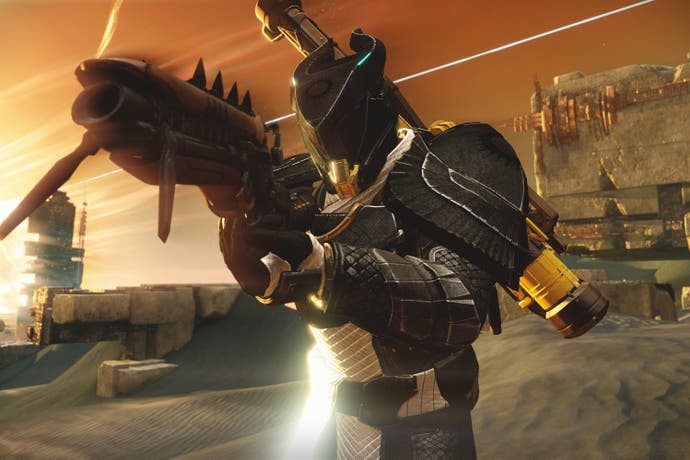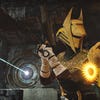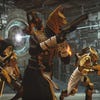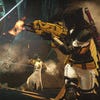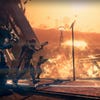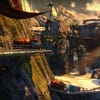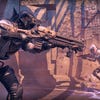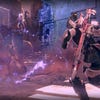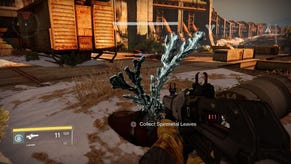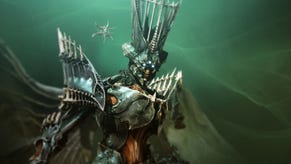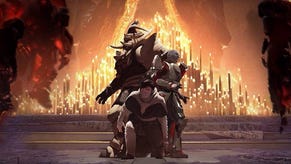House of Wolves gives Destiny PvP an endgame worth investing in
Here's how it works.
Destiny's competitive multiplayer, called Crucible, doesn't reward player "investment" in the same way the player versus environment portion of the game does. That is to say, Crucible rewards are muck. Six-player groups take on Destiny's wonderful Raids in the pursuit of powerful Legendary-class weapons and high level equipment that can only be obtained by completing difficult encounters and defeating computer-controlled bosses. There's an element of randomness to the coveted Raid drops, so on any given run you may not get that helmet you've been after since Destiny launched in September, but at least you know which items you're in with a chance of getting.
For those who brave Crucible there is no such certainty. All you have is the prospect of, after each 10 minute or so match, getting items you'll probably instantly de-construct into materials you already have stacks of. Yes, there's a chance you'll get an Exotic class weapon after completing a match, but the chance is so slim that when - if - it does happen, you almost can't believe it has. I still remember the day a friend of mine got Gjallarhorn, an Exotic rocket launcher considered the best in the game, as a random drop from Crucible. I lost my shit down the microphone.
Destiny's PvP does not have a proper, meaningful "endgame". And what I mean here is that Crucible is the worst way to get great gear and hit the level cap. Bungie tackled this problem with the addition of the Iron Banner special event: an intense, well-thought out mode in which the statistics of items matter and unique, high-level equipment and weapons are up for grabs, but getting this gear requires significant reputation with the Iron Banner itself. And given the event only runs in short, sharp bursts, for many players, myself included, the entire exercise is somewhat futile.
And so we come to House of Wolves, Destiny's second downloadable add-on, and Trials of Osiris, Bungie's attempt at giving PvP an actual endgame players care about.
Trials of Osiris is a weekly 3v3 elimination event where, like Iron Banner, player power matters. To enter you need a Trials Passage, which works like a scorecard that tracks your team's wins and losses. The more wins your team gets in each Passage, the better your rewards. And the rewards are brilliant: endgame gear that makes your Guardian look like a futuristic Egyptian god.
Trials of Osiris uses a new game mode called Elimination, which emerged, Bungie says, from a simple and smart idea: what if the wipe mechanic from PvE was added to PvP? Your goal in each round is to wipe the enemy team. Guardians can revive teammates, but not themselves. Wipe out the enemy team and your team scores a point. The first team to five points wins the match.
More than any other PvP mode in Destiny, Trials requires communication. Because you can't self-revive and there are only three players on each team, killing and dying is meaningful. You creep around, peeking out from cover, seeking out sight lines and chucking grenades more in hope than expectation. The elimination element of the mode makes every engagement matter - and as a result terrifying. Knowing when to retreat is crucial. Guardian down? Can they be revived? Can I revive them? Should I revive them? Then you're the Last Guardian Standing, and there's only one enemy left on the opposition team. It's a stand off. Who will win?
Focus, strategy and having a bloody plan are essential to success. You need a Fireteam that knows what it's doing. Without one you'll lose. And lose. And lose. But once you get into Elimination, once you dig deeper into the map layout and start talking with your teammates, success can be thrilling. In one particularly tense Trials match I played on the close quarters-focused The Burning Shrine map, I used my rocket launcher to wipe out the opposition team one Guardian at a time - as Last Guardian Standing. It comes as no surprise, given Bungie's philosophy on matchmaking and Raids, to learn that you need to form your own Fireteam to play Trials of Osiris, and, given Bungie wants players to really dig into the strategy required by the mode, that it's locked to just one map each week.
"If Control and Rumble are on this end of the spectrum in terms of intensity and personal responsibility, Elimination is on the extreme other end," says Derek Carroll, PvP design lead on House of Wolves.
"Every second to second decision you make matters, and it matters to your team. They know you died and not just somebody died."
Trials of Osiris is rock hard, then, and pretty intimidating, but you'll want to get stuck in because the armour on offer is up there with the coolest-looking in the game. Here's how you get it: after three losses your scorecard - or Trials Passage - must be turned in to Brother Vance, an NPC vendor who's set up shop in The Reef social space. The number of wins you've managed determines the tier of rewards you can access. Here's the breakdown, as we saw it when we returned to The Reef during a recent hands-on opportunity.
- Two wins: Stone Tier prizes.
- Three wins: Bronze Tier prizes.
- Five wins: Vest of the Exile Legendary chest armour.
- Six wins: Silver Tier prizes.
- Seven wins: The Summoner Legendary auto rifle.
- Eight wins: Gold Tier prizes.
- Nine wins: We're not sure. Bungie told us we'll have to wait until House of Wolves launches to find out.
Brother Vance's stock refreshes each week, so it'll take some time before players get a full set of Osiris gear as well as the fancy new weapons. But help is at hand: Brother Vance sells buff consumables that cost three Passage Coins (a new material added with House of Wolves) each. The Favour of Osiris, for example, means you start the Trials with a win already awarded. Mercy of Osiris means your first loss doesn't count. And Boon of Osiris means winning your first Trials match counts as two. These buffs stack, and will no doubt prove essential for Fireteams who hope to reach the treasured maximum of nine wins in a single Passage.
"If you are a PvP player and you like caring about winning and getting the best stuff and PvE is less interesting to you, this is another way for you to do this," Lars Bakken, design lead for Crucible, adds.
"It's true of House of Wolves in general. We wanted to give you multiple routes to get to the endgame, and have multiple new endgame things, without there just being the crux, the one thing."
Certainly the Elimination game mode, which once House of Wolves comes out will be added to Crucible as a weekly rotator in the same way the Inferno mode pops up from time to time, is a more hardcore PvP affair. But what's best about it is it plays significantly different from the other Crucible modes currently in the game, while still working within the confines of Destiny's unique competitive multiplayer feel.
It feels like a natural progression, rather than a revolutionary step. The Skirmish and Salvage Crucible modes already let players revive each other. But add in new on-screen information, a dash of new Lord Shaxx voice over commentary (still annoying, especially when you're losing) and the wipe mechanic, and Elimination stands out. Let's not overstate the impact: many first-person shooters have applied Elimination-style modes to their own games - Bungie isn't revolutionising the genre here - but for Destiny PvP, Trials of Osiris feels like a breath of fresh air - something Crucible's lacked since the game launched in September.
Even outside of Trials of Osiris, bog standard Crucible will become more useful. Bungie has, across the Crucible board, doubled the number of Marks, engrams and reputation gain a completed match grants the player. Bungie's also popped 12 new Legendary-class items into the Crucible reward stream, so you'll see purples drop more often.
And here, for me, is the best tweak: the daily Crucible playlist now rewards your time. As before, it shows up on the main page of the Director in the top left hand corner of the screen (the icon with the cross swords). Currently it's not particularly popular, as all you get from playing it is yet more experience. But soon playing just one match in the daily Crucible featured playlist will reward you with a package that includes Motes of Light, the aforementioned Passage Coins as well as engrams. The idea is players will think of it as PvP's version of doing the daily story mission or Patrols for bounties.
"Overall Destiny is a fast-paced action game with the RPG elements and the investment game where you're constantly looking for loot and constantly upgrading everything. We didn't unify that with the Crucible well enough," Carroll admits. "So we're taking steps in the House of Wolves to bring those together and make it more like the other activities."
"We found relatively quickly after launch, we made this game where everything in it was relatively intrinsically fun, but we added and layered on rewards everywhere except for Crucible," Bakken says. "That was a big mistake, and we knew that."
House of Wolves is Bungie's attempt to make up for this mistake. PvP is getting more interesting, but perhaps more importantly it's also getting more relevant. The big question is whether Trials of Osiris can keep PvP fans going until the launch of Comet, the major Destiny expansion most believe will launch later this year. The fervour and speed with which Destiny players - myself included - gobble up new content, I'm not sure it can. But with proper endgame loot on offer - to my mind the coolest-looking endgame loot in the game - I'm confident in predicting House of Wolves will give Destiny PvP a much-needed shot in the arm.
And you couldn't say that about The Dark Below.
This article is based on a press trip to Bellevue. Activision paid for travel and accommodation.
